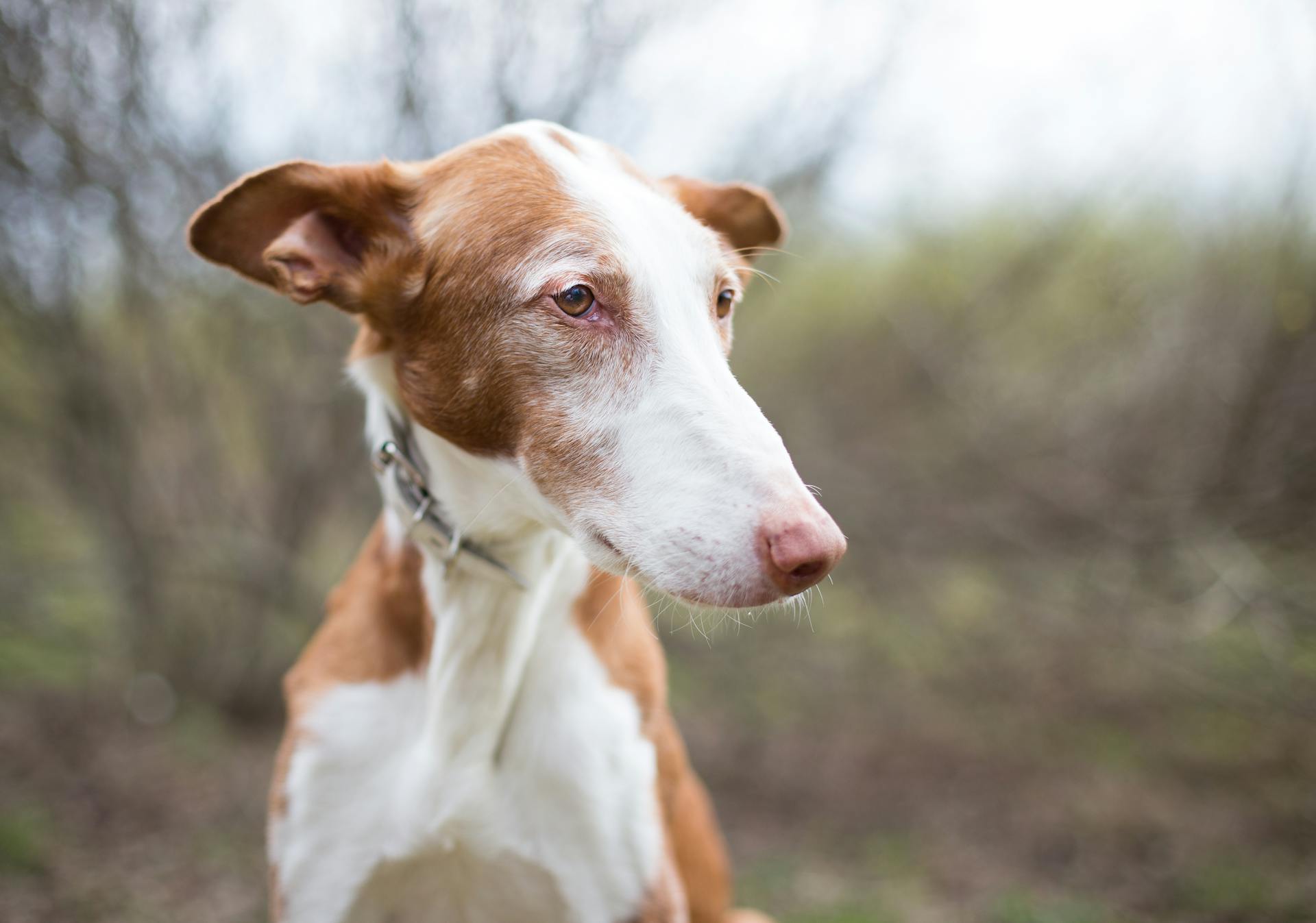
Canine distemper vaccine side effects can be a concern for many dog owners. The vaccine is typically administered in combination with other vaccinations, such as parvovirus and adenovirus.
Some common side effects of the canine distemper vaccine include swelling at the injection site, which can be a sign of a minor reaction. This is usually temporary and resolves on its own within a few days.
Other possible side effects include lethargy, loss of appetite, and vomiting, which can occur in some dogs after receiving the vaccine. These symptoms are usually mild and short-lived, but it's essential to monitor your dog's health closely after vaccination.
In rare cases, the canine distemper vaccine can cause more serious side effects, such as anaphylaxis, a severe and potentially life-threatening allergic reaction.
Symptoms and Effects
Mild side effects from the distemper vaccine are common and can include lethargy, loss of appetite, fever, and localized swelling at the injection site.
Most mild side effects will resolve on their own within 24-48 hours. If your dog hasn't returned to normal within this timeframe, it's a good idea to speak with your vet.
A vaccine reaction can also occur, which is an immune system response to the vaccine. This can manifest as hives, facial swelling, and trouble breathing.
If you notice any of these symptoms, call a veterinarian immediately.
Here are some common symptoms of a vaccine reaction:
- Hives
- Facial swelling
- Trouble breathing
In severe cases, a vaccine reaction can be life-threatening and require immediate veterinary attention. Your vet may prescribe a medication to help your pet feel better, and in some cases, hospitalization may be necessary.
A low-grade fever is also a possible side effect of the distemper vaccine. This is usually not a cause for concern and will resolve on its own.
If your dog is experiencing a high fever, vomiting, diarrhea, or difficulty breathing, seek veterinary attention immediately.
Side Effects and Treatment
If you notice any side effects after vaccinating your dog against distemper, it's essential to monitor their health closely. In severe cases, treatment may be necessary.
Mild side effects, which are common, include tenderness or pain at the site of injection, low-grade fever, fatigue, reluctance to eat, coughing or sneezing, and a small bump at the injection site.
More severe side effects, though rare, can occur, including serious immune-mediated reactions. These can be life-threatening and require immediate veterinary attention.
If your dog experiences vomiting, diarrhea, hives, swelling on the face, nose, or around the eyes, difficulty breathing, or collapse after vaccination, contact your veterinarian or an emergency clinic immediately.
Your veterinarian may prescribe medication to help your dog feel better if they experience mild side effects. In severe cases, they may recommend treatment with antihistamines, steroids, IV fluids, and oxygen.
Some dogs are more likely to have a vaccine reaction due to their genetics, including small-breed dogs and Boxers. In these cases, your veterinarian may recommend medicating your dog before vaccination.
Broaden your view: Home Treatment for Canine Distemper
To reduce the risk of a reaction, it's best to separate vaccines by at least two weeks. This allows for a more controlled study of which vaccine caused an adverse event.
Here are some common symptoms of a vaccine reaction:
- Hives
- Facial swelling
- Trouble breathing
If you notice these symptoms, call a veterinarian immediately. Your veterinarian may take additional precautions, such as pre-medicating with steroids or antihistamines, or adjusting the vaccination schedule.
Safety and Prevention
If your dog has had a reaction to a vaccine, it's essential to let your veterinarian know, no matter how mild the reaction was.
Reactions can become more severe with subsequent vaccinations, so it's crucial to inform your vet about any previous reactions.
Small-breed dogs and Boxers are more likely to have a vaccine reaction due to their genetics.
Medications like antihistamines can be helpful in controlling an immune-mediated reaction in some cases.
Giving multiple vaccines at one time or within two weeks of each other can increase the risk of an adverse reaction.
Separating vaccines by at least two weeks can help reduce this risk and allow for a more controlled study as to which vaccine caused an adverse event.
If your dog has previously experienced side effects from vaccinations, your veterinarian may recommend skipping a specific vaccine in the future.
For smaller breed dogs, scheduling vaccinations over several days can help reduce the risk of a reaction.
Here are some common signs of a serious vaccine reaction:
- Hives
- Facial swelling
- Trouble breathing
If you notice these symptoms, call a veterinarian immediately.
Serious Cases
Mild side effects from a vaccine can last longer than a day, so it's essential to contact your veterinarian if you notice any persistent issues.
If your dog experiences a life-threatening reaction, such as anaphylaxis, it requires immediate veterinary attention. Clinical signs of an anaphylactic reaction include vomiting or diarrhea, hives, swelling on the face, nose/muzzle, or around the eyes, difficulty breathing, and collapse.
A more serious, though rare, side effect is a vaccine reaction, which can include hives, facial swelling, and trouble breathing. If you notice these symptoms, call a veterinarian immediately.
Your veterinarian may take additional precautions if your dog has a history of vaccine reactions, such as pre-medicating with steroids or antihistamines, or adjusting the vaccination schedule.
In rare cases, a vaccine reaction can be life-threatening, so it's crucial to recognize the symptoms and seek help right away.
Frequently Asked Questions
How long do distemper shot side effects last?
Most side effects from the distemper shot are mild and typically resolve within 24 hours
Sources
- https://www.petmd.com/dog/general-health/possible-vaccine-reactions-in-dogs
- https://bestfriendspetcare.com/distemper-in-dogs-causes-symptoms-and-prevention/
- https://www.petfinder.com/dogs-and-puppies/health-wellness/vaccinations-shots/vaccinations-side-effects/
- https://www.embracepetinsurance.com/waterbowl/article/distemper-vaccine-for-dogs
- https://www.broglilaneweaver.com/site/blog/2022/02/21/vaccine-reactions-dogs
Featured Images: pexels.com


